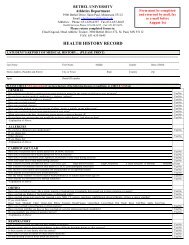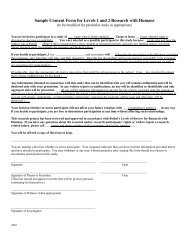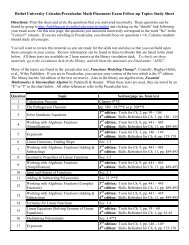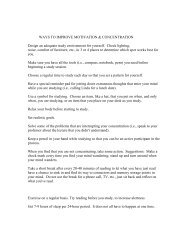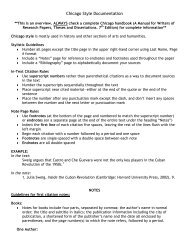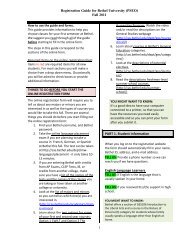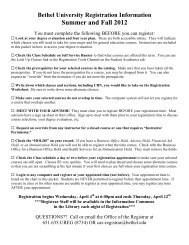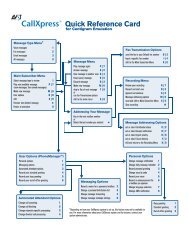here - College of Arts & Sciences - Bethel University
here - College of Arts & Sciences - Bethel University
here - College of Arts & Sciences - Bethel University
Create successful ePaper yourself
Turn your PDF publications into a flip-book with our unique Google optimized e-Paper software.
The debaters determine who gets my ballot. To the best <strong>of</strong> my ability I will not intervene<br />
my own ideals into the debate. I will evaluate the positions advocated in the round solely<br />
as they are presented. I do believe some parli resolutions support fact/value cases in<br />
addition to policy. I believe fact and value cases provide a unique opportunity to have an<br />
intelligent, interesting and educational debate and t<strong>here</strong>fore, are just as legit as policy.<br />
That being said, if an opposition team chose to run a “fact bad” position and the<br />
affirmative did not counter in any way whatsoever, though it would pain my heart, I<br />
would vote on the dropped “fact bad”. I take the same approach to topical counter-plans.<br />
While I believe counter-plans should be non-topical, an opposition is free to run a topical<br />
counter-plan and pray that divine intervention clouds the affirmative’s ability to point out<br />
topical counter-plans still uphold the resolution, thus winning the ballot for the<br />
affirmative. My point is, while I won’t throw out a position based on my own personal<br />
beliefs, it is not hard for affirmative teams to throw out these two particular positions for<br />
me.<br />
Relative importance <strong>of</strong> presentation/communication skills to the critic in decision-making<br />
:<br />
I have yet to see a round I couldn’t flow however, I don’t recommend testing me. Speed<br />
should be used to further build arguments and efficiently refute the flow, not to spread<br />
unwarranted blips <strong>of</strong> pretend points and fluff. Arguments, which ultimately are the most<br />
important facet <strong>of</strong> the round, should be presented in a clear, precise and structured<br />
format. Signposting is a must. I don’t like to do your work for you and if I’m not sure<br />
w<strong>here</strong> you want your argument on the flow I will most likely not write it down or,<br />
depending on how much Starbucks I’ve had that day, I will jot it down at the bottom <strong>of</strong><br />
my flow w<strong>here</strong> I stick random, not linked arguments that I usually don’t vote on.<br />
Relative importance <strong>of</strong> on-case argumentation to the critic in decision-making:<br />
The job <strong>of</strong> the affirmative is to prove the Resolution true. The opposition, in whatever<br />
way they deem appropriate, should counter the affirmative advocacy.<br />
Openness to critical/performative styles <strong>of</strong> debating:<br />
Any style is fine as long as positions are explained in an easily understood manner.<br />
Any additional comments:<br />
Regardless <strong>of</strong> position (K’s, T’s, specs, etc.) I like good arguments. I dislike bad<br />
arguments. If you have a good argument, run it. If you have a bad argument and nothing<br />
else, run it anyway and hope the other team doesn’t realize how bad it is. In this way<br />
debate is like a Chinese buffet; try a bit <strong>of</strong> everything until you find the one that tastes<br />
like chicken. The easiest way to win my ballot: Don’t Suck.<br />
167



